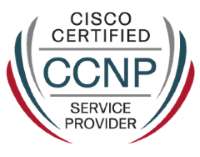Course Content
- Describe the main characteristics of routing protocols that are used in Service provider environments
- Implement advanced features of multiarea Open Shortest Path First (OSPFv2) running in Service Provider networks
- Implement advanced features of multilevel Intermediate System to Intermediate System (ISIS) running in Service Provider networks
- Configure route redistribution
- Configure Border Gateway Protocol (BGP) in order to successfully connect the Service Provider network to the customer or upstream Service Provider
- Configure BGP scalability in Service Provider networks
- Implement BGP security options
- Implement advanced features in order to improve convergence in BGP networks
- Troubleshoot OSPF, ISIS, and BGP
- Implement and verify MPLS
- Implement and troubleshoot MPLS traffic engineering
- Implement and verify segment routing technology within an interior gateway protocol
- Describe how traffic engineering is used in segment routing networks
- Implement IPv6 tunneling mechanisms
- Describe and compare core multicast concepts
- Implement and verifying the PIM-SM protocol
- Implement enhanced Protocol-Independent Multicast – Sparse Mode (PIM-SM) features
- Implement Multicast Source Discovery Protocol (MSDP) in the interdomain environment
- Implement mechanisms for dynamic Rendezvous Point (RP) distribution
Course content
- Implementing and Verifying Open Shortest Path First Multiarea Networks
- Implementing and Verifying Intermediate System to Intermediate System Multilevel Networks
- Introducing Routing Protocol Tools, Route Maps, and Routing Policy Language
- Implementing Route Redistribution
- Influencing Border Gateway Protocol Route Selection
- Scaling BGP in Service Provider Networks
- Securing BGP in Service Provider Networks
- Improving BGP Convergence and Implementing Advanced Operations
- Troubleshooting Routing Protocols
- Implementing and Verifying MPLS
- Implementing Cisco MPLS Traffic Engineering
- Implementing Segment Routing
- Describing Segment Routing Traffic Engineering (SR TE)
- Deploying IPv6 Tunneling Mechanisms
- Implementing IP Multicast Concepts and Technologies
- Implementing PIM-SM Protocol
- Implementing PIM-SM Enhancements
- Implementing Interdomain IP Multicast
- Implementing Distributed Rendezvous Point Solution in Multicast Network
Labs
- Implement OSPF Special Area Types (IPv4 and IPv6)
- Implement Multiarea IS-IS
- Implement Route Redistribution
- Influence BGP Route Selection
- Implement BGP Route Reflectors
- Implement BGP Security Options
- Troubleshoot Routing Protocols
- Implement MPLS in the Service Provider Core
- Implement Cisco MPLS TE
- Configure and Verify Interior Gateway Protocol (IGP) Segment Routing
- Implement Tunnels for IPv6
- Enable and Optimize PIM-SM
- Implement PIM-SM Enhancements
- Implement Rendezvous Point Distribution
Test certification
Recommended as preparation for the following exams:
300-510 – Implmenting Cisco Service Provider Advanced Routing Solutions (SPRI) exam
After you pass 300-510 SPRI, you earn the Cisco Certified Specialist – Service Provider Advanced Routing Implementation certification, and you satisfy the concentration exam requirement for the CCNP Service Provider certification.

